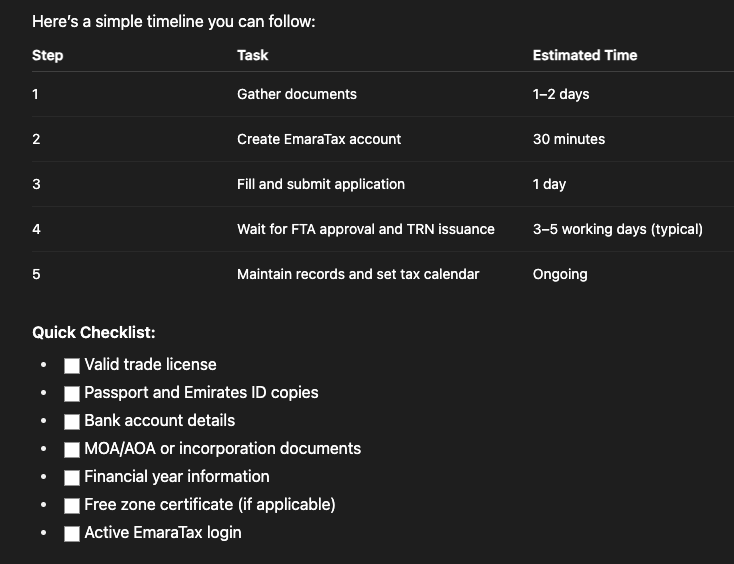How to Register for Corporate Tax in UAE – Step-by-Step Guide
Learn how to register for corporate tax in UAE with this simple step-by-step guide. Discover who must register, required documents, deadlines, and how to apply on the FTA’s EmaraTax portal — stay compliant and avoid penalties!
Mehreen Rauf Khan
10/21/20257 min read


Corporate tax is now a key part of doing business in the UAE. Since June 2023, most companies operating in the UAE are required to register for and comply with the new federal corporate tax system. Whether you run a mainland company, operate in a free zone, or are a freelancer earning business income, understanding how to register for corporate tax is essential to stay compliant and avoid penalties.
This guide explains who needs to register, what documents you’ll need, how to register through the FTA’s EmaraTax portal, and what happens after registration — in simple, easy-to-follow steps.
1. What is Corporate Tax and Why Registration Matters
Corporate tax is a federal tax imposed on the net income (profits) of businesses in the UAE. The Federal Tax Authority (FTA) oversees registration, filing, and payment of this tax, while the Ministry of Finance sets the overall policy framework.
The standard corporate tax rate is 9% on taxable income exceeding AED 375,000, while income up to that level is taxed at 0%. Free zone companies that meet certain qualifying criteria can continue to enjoy a 0% tax rate on qualifying income, but they still must register for corporate tax.
Registering on time is mandatory — even if you expect to pay 0%. It ensures you get a Tax Registration Number (TRN), which you’ll need for filing returns, claiming exemptions, and corresponding with the FTA. Failure to register can lead to administrative penalties and may affect your ability to conduct business legally.
2. Who Must Register for Corporate Tax in the UAE
Not every individual or business in the UAE is automatically subject to corporate tax, but most formal business structures must register. Here’s a breakdown:
a. Resident Juridical Persons
All companies incorporated or effectively managed and controlled in the UAE must register. This includes:
Limited Liability Companies (LLCs)
Private shareholding and public shareholding companies
Establishments or other incorporated legal entities
These entities are considered resident persons and must register regardless of their profit level.
b. Free Zone Companies
Even if a free zone company qualifies for a 0% corporate tax rate, it must still register for corporate tax with the FTA. Registration ensures the entity is recognized and monitored for compliance with qualifying free zone conditions.
c. Non-Resident Juridical Persons
Foreign companies may need to register if they have a permanent establishment (PE) or nexus in the UAE, or if they derive state-sourced income (for example, UAE-based contracts or management fees).
d. Natural Persons (Individuals)
Freelancers and sole proprietors operating under trade licenses or conducting business in the UAE are also subject to registration if their annual turnover from business activities exceeds the threshold set by the FTA. Employment income, real estate investment, and personal investment income are generally excluded.
3. Registration Deadlines and Timelines
The FTA has issued detailed timelines for when each type of business must register.
Existing UAE Companies: Businesses incorporated before March 2024 are given specific deadlines based on their incorporation date.
New Businesses: Newly formed entities must register within three months from the date of incorporation.
Natural Persons: Individuals who meet the business income threshold must register by the deadlines specified by the FTA (for example, some by 31 March 2025).
Non-Residents: Must register within three months of establishing a permanent establishment or deriving taxable income in the UAE.
Missing these deadlines can result in administrative penalties, so it’s important to confirm your entity’s applicable date through the FTA website or your business consultant.
4. Penalties for Late or Missing Registration
Failure to register within the allowed timeframe can lead to financial penalties, as defined by the Federal Tax Authority. These penalties can apply even if your company has not yet generated taxable income.
In addition, late registration may delay your ability to file returns or claim 0% status (for qualifying free zone entities), and could raise compliance flags during audits.
It’s always best to register proactively as soon as you become eligible rather than waiting for an official notice.
5. Documents Required for Corporate Tax Registration
Before you begin your registration on the EmaraTax portal, make sure you have all necessary documents ready. Here’s a typical checklist:
Trade License or Commercial License
– Shows your business’s legal existence and activities.Certificate of Incorporation or MOA/AOA
– For companies, include Memorandum and Articles of Association.Passport and Emirates ID of Owners or Authorized Signatories
– Required for identification.Contact Information
– Business address, email, and mobile number.Bank Account Details
– For linking payments and refunds.Financial Year Details
– Usually aligned with your trade license year or accounting cycle.Free Zone Certificate (if applicable)
– For entities operating within a free zone.Proof of Management Control or Parent Company Details
– For branches or subsidiaries.
Having these ready ensures a smooth registration process and avoids delays in TRN issuance.
6. How to Register for Corporate Tax (Step-by-Step on EmaraTax Portal)
The EmaraTax portal is the UAE government’s official online system for tax registration and compliance. Follow these simple steps:
Step 1: Create an EmaraTax Account
Go to the official EmaraTax portal and create an account using your email and mobile number. If you already have an account for VAT purposes, you can use the same login.
Step 2: Add a Taxable Person Profile
After logging in, create a “Taxable Person” profile. Select whether you are registering as:
A Juridical Person (company, establishment, etc.)
A Natural Person (individual conducting business activities)
Step 3: Select “Corporate Tax Registration”
Choose Corporate Tax from the list of available tax types. The system will guide you through the online registration form.
Step 4: Fill in the Application Form
Provide details such as:
Legal name of entity
Trade license number and expiry date
Business activity
Financial year start and end date
Ownership structure
Address and contact information
Step 5: Upload Required Documents
Attach the documents listed earlier (license, ID, MOA, etc.). Ensure the files are clear and valid.
Step 6: Review and Submit
Double-check all information before submission. Once submitted, you’ll receive a confirmation email acknowledging receipt of your application.
Step 7: Receive Your TRN (Tax Registration Number)
After the FTA verifies your details, they’ll issue a Tax Registration Number (TRN). You’ll be notified by email, and the TRN will appear in your EmaraTax dashboard.
Once you have your TRN, your business is officially registered for UAE corporate tax.
7. What Happens After Registration
After you receive your TRN, you’re officially recognized by the FTA as a registered taxpayer. The next steps are:
Maintain Proper Accounting Records
– Keep accurate books of accounts, invoices, and supporting documents.Determine Your Tax Period
– Typically your company’s financial year.Calculate Taxable Income
– Based on net profit adjusted for tax purposes.File Annual Corporate Tax Returns
– The return must be submitted within nine months after the end of your financial year.Pay Any Tax Due
– Payment is also due within nine months of the tax period’s end.
For example, if your financial year ends on 31 December 2024, your tax return and payment must be completed by 30 September 2025.
8. Corporate Tax Rates and Thresholds
As of 2025, the UAE applies the following standard rates:
0% tax rate on taxable income up to AED 375,000
9% tax rate on taxable income exceeding AED 375,000
0% qualifying income for eligible free zone entities, subject to meeting certain conditions
Businesses earning income from the extraction of natural resources remain subject to Emirate-level taxation and are exempt from federal corporate tax.
Example:
If your company’s taxable profits for the year are AED 600,000, then:
The first AED 375,000 is taxed at 0% = AED 0
The remaining AED 225,000 is taxed at 9% = AED 20,250
Your total corporate tax liability would be AED 20,250 for that year.
9. Special Cases: Free Zones, Non-Residents, and Individuals
a. Free Zone Companies
Free zone companies must register for corporate tax even if they qualify for a 0% tax rate on certain income. To maintain this benefit, they must:
Meet the “qualifying income” criteria under the Corporate Tax Law
Maintain adequate substance within the free zone
File annual corporate tax returns on time
Failing to meet these requirements can lead to losing the 0% benefit and being taxed at the standard 9% rate.
b. Non-Resident Companies
A non-resident company must register if it has a permanent establishment (such as a branch or office) in the UAE or earns UAE-sourced income. Examples include consultancy services performed in the UAE or management fees received from UAE entities.
c. Natural Persons (Freelancers, Sole Proprietors)
Individuals earning income from business or commercial activities must register if their annual turnover exceeds the threshold set by the FTA.
Freelancers with trade licenses, influencers earning business income, and sole proprietors are often included. Personal salary or employment income does not count toward the threshold.
10. Common Mistakes to Avoid During Registration
Many businesses face delays or penalties due to small but avoidable mistakes. Here are the most common ones:
Missing the Deadline
– Always check your incorporation date and apply before your specific deadline.Using Incomplete or Expired Documents
– Ensure your trade license and ID documents are valid at the time of submission.Choosing the Wrong Taxable Person Type
– Be sure whether you’re registering as a juridical person (company) or a natural person (individual).Incorrect Financial Year Selection
– Choose the financial year that matches your accounting period or trade license cycle.Not Updating Details After Submission
– Inform the FTA immediately if your business address, ownership, or financial year changes.
By taking care of these points, you’ll save yourself time and prevent costly compliance errors.
11. Timeline and Checklist for Registration


12. Final Thoughts
Corporate tax registration in the UAE may seem complicated at first, but once you understand the process, it’s straightforward. The key is to register on time, keep your documents in order, and maintain clear financial records throughout the year.
If you operate a business — whether a small startup, a free zone company, or even as a freelancer — it’s essential to comply with the corporate tax regulations. Registration is not just a legal requirement; it also positions your business as professional, credible, and future-ready.
Summary of Key Takeaways:
Registration is mandatory for all UAE companies, free zone entities, non-residents with UAE income, and eligible natural persons.
Use the EmaraTax portal to register and obtain your Tax Registration Number (TRN).
File your corporate tax return within nine months of your financial year-end.
Keep all accounting and business records up to date.
Avoid penalties by registering early and staying compliant.
Need Help?
If you’d like professional assistance with your corporate tax registration or compliance in the UAE, we can help. As experienced accountants and tax advisors based in Dubai, we handle the entire process — from registration to filing — ensuring full compliance and peace of mind.
Get in touch today to schedule a consultation and make your corporate tax registration quick, accurate, and hassle-free.